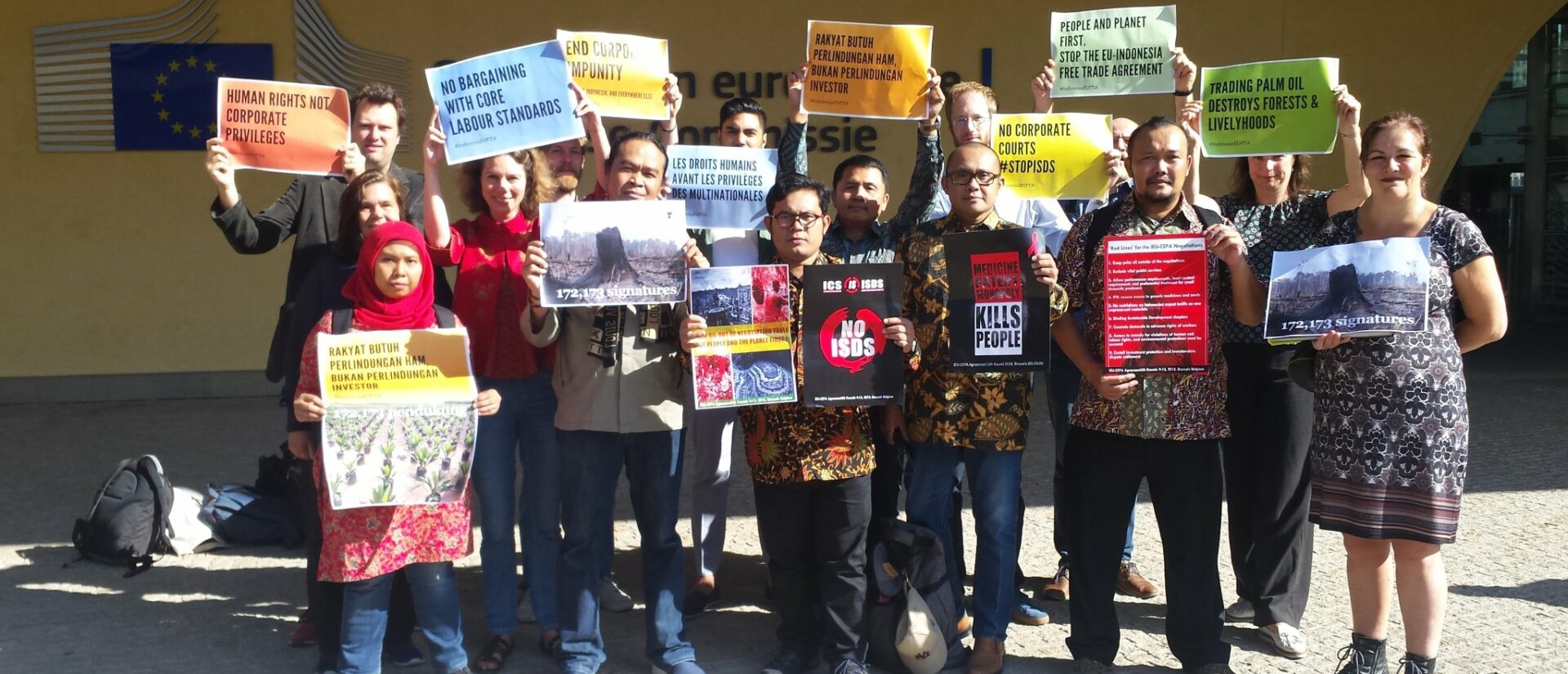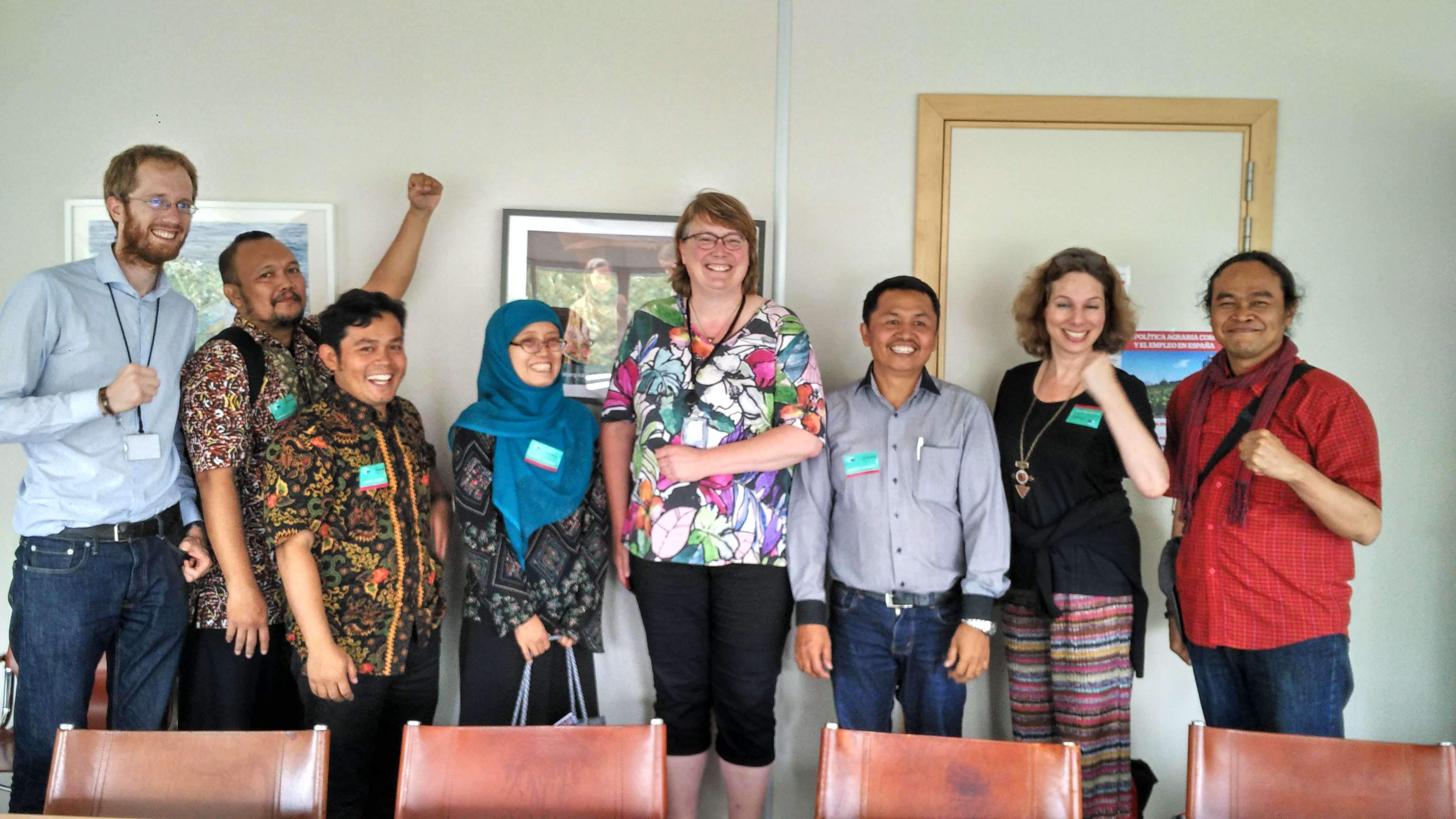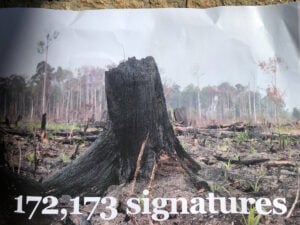
5th round of CEPA negotiations: civil society calls attention to human rights and environmental concerns
This week, SOMO joined a group of European and Indonesian civil society organisations (including trade unions) in Brussels on the occasion of the 5th round of negotiations for an Indonesia-EU Comprehensive Partnership Agreement (IEU CEPA). The purpose was to call attention to the potential negative impact this free trade and investment agreement can have on human rights and the environment.
The EU-Indonesia CEPA negotiations
An IEU CEPA would enhance market access for European companies and service providers in Indonesia. These companies would be profiting from adverse labour conditions in that country and the suppression of fundamental labour rights, such as the right to strike for better pay. Particular attention was called to the labour conditions in the palm oil sector, where excessively long working hours and child labour are the order of the day, and workers’ health is at risk from the use of hazardous pesticides. While demand for palm oil in the EU is growing – palm oil is used in a wide variety of products, from biscuits and crisps to shampoos and detergents, the palm oil sector is also associated with environmental destruction, land-grabbing and deforestation on a large scale. An IEU CEPA would only boost the trade in palm oil. Because free trade in palm oil would be disastrous to people and planet, Indonesian and European NGOs are calling for palm oil to be excluded from the CEPA agreement.

SOMO’s partner Indonesia for Global Justice, Indonesian trade union organisations KSBSI and KPRI, the fisher folk association KIARA and Indonesian experts in the area of intellectual property rights and access to medicines and their European counterparts, including the Seattle to Brussels Network, Friends of the Earth Europe, the Dutch trade union confederation CNV, BothEnds, FERN and others all raised their concerns about the impacts of the CEPA. We list some of the most pressing issues:
- Negative health impacts are foreseen as a result of the CEPA agreement: the extended Intellectual Property Rights protection and data exclusivity foreseen in the agreement will stand in the way of the availability of the affordable generic medicines Indonesia requires to meet the health needs of its people.
- The exploration, extraction and exploitation of mineral resources is a key focus in the IEU CEPA, which carries its own human rights and environmental risks. These include land-grabbing, displacement of local communities, and large scale destruction of rain forests and coastal areas. Indonesia’s efforts to better regulate mining corporations to promote sustainable development or ensure a higher contribution from Indonesia’s natural wealth to the domestic economy are undermined by the proposed investment provisions in the IEU CEPA.
- The impacts of the investor-state dispute settlement mechanism, which enables foreign investors to launch multimillion dollar compensation claims against new and tighter regulations introduced by the state, caused Indonesia to decide to cancel all of its bilateral investment agreements and seek to renegotiate them according to a model that would leave the country more policy space and freedom to regulate. An investment chapter included in a comprehensive free trade agreement like the CEPA would once again provide European investors with a powerful tool to exert pressure on the Indonesian government to abandon legislation that is undesirable in the eyes of business. This is why civil society is calling for no investment protection/investor-state dispute settlement in the CEPA.
- A CEPA would also facilitate the influx of European investors to develop Indonesia’s tourism market. Indonesia’s president Jokowi has designated tourism as a key area to boost domestic growth. Once again, the associated risks, as highlighted by KIARI, include displacement of local communities and reduced access to the coast and coastal waters for local fishing communities, leading to increased poverty.
An analysis(opens in new window) of the draft texts of the CEPA carried out by Friends of the Earth Europe gives the trade deal a score of 4.5 out of 20 for sustainability.
 These concerns were shared with the European Commission, along with the handing over of a petition signed by well over 170,000 people(opens in new window)
calling for a stop to the trade in unsustainable palm oil. A civil society delegation also raised these issues in their meeting with the Indonesian negotiators. The Indonesian civil society delegation also met with several MEPs, including GUE NGL’s Anne Marie Mineur and member of the European Parliament’s Committee on International Trade.
These concerns were shared with the European Commission, along with the handing over of a petition signed by well over 170,000 people(opens in new window)
calling for a stop to the trade in unsustainable palm oil. A civil society delegation also raised these issues in their meeting with the Indonesian negotiators. The Indonesian civil society delegation also met with several MEPs, including GUE NGL’s Anne Marie Mineur and member of the European Parliament’s Committee on International Trade.
Civil society calls for a CEPA agreement that promotes sustainable trade and investment, prioritizing human rights, environmental protection and climate change mitigation. The architecture of trade agreements like the CEPA must reflect this: they should regulate, not liberalise, trade and investment according to these principles. They must not rely on weak and voluntary corporate social responsibility guidelines, but lay down binding and enforceable obligations that foreign investors must meet in relation to human rights, social standards, protection of the environment and climate objectives.
Do you need more information?
-

Bart-Jaap Verbeek
Researcher
Related news
-
 Dutch State accused of failing to prevent genocidePosted in category:Case
Dutch State accused of failing to prevent genocidePosted in category:Case Lydia de LeeuwPublished on:
Lydia de LeeuwPublished on: -
-
 The Counter: strengthening the fight for climate justice around the worldPosted in category:Long read
The Counter: strengthening the fight for climate justice around the worldPosted in category:Long read Luis ScungioPublished on:
Luis ScungioPublished on:


